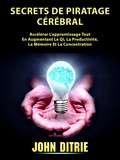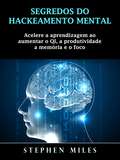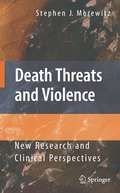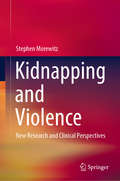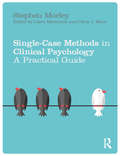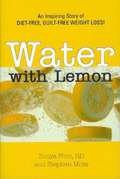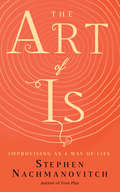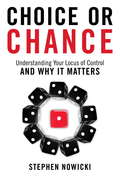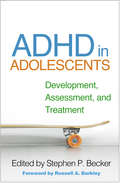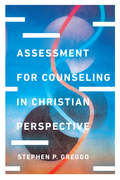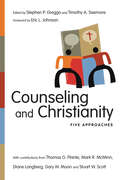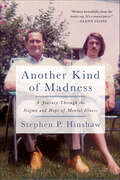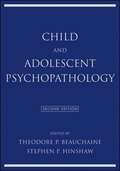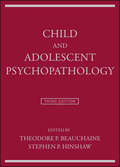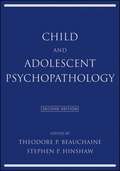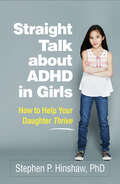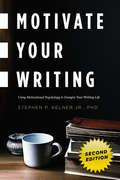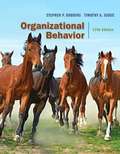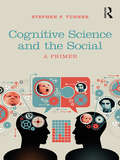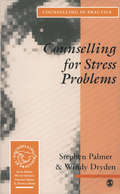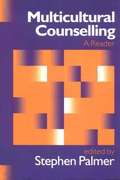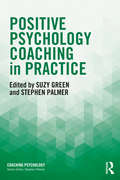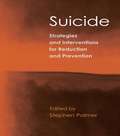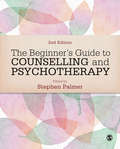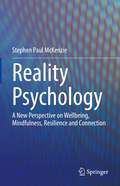- Table View
- List View
Secrets De Piratage Cérébral: Accélérer l'apprentissage tout en augmentant le QI, la productivité, la mémoire et la concentration
by Stephen MilesLes secrets que les professionnels utilisent pour optimiser leur cerveau! Avec des décennies de stratégies testées, cet ebook vous montrera le moyen le plus rapide et le plus efficace de mettre à niveau votre mémoire. Vous allez apprendre comment augmenter la cognition et augmenter le QI en quelques heures seulement. Non seulement cela, mais vous serez plus concentrés, vous accomplirez plus et plus avec une énergie que vous n’avez jamais eu auparavant. Vous voulez savoir comment les meilleurs et les plus brillants du monde fonctionnent à des niveaux aussi élevés? Même si vous ayez qu'une intelligence moyenne, vous pouvez aussi apprendre les secrets pour atteindre ce type de performance. Ce guide vous enseigne des techniques éprouvées pour améliorer votre mémoire. Ce qui est inclu: Programme de formation efficace et rapide. Augmentation de la productivité. Augmenter la mémoire. Augmenter le focus. Augmenter l'intelligence globale. Et BEAUCOUP PLUS! Si vous voulez entraîner votre cerveau de la meilleure façon possible, ce livre est pour vous. Faites défiler vers le haut de la page et cliquez sur Ajouter au panier pour acheter instantanément Avertissement: Cet auteur et / ou le (s) titulaire (s) des droits ne font aucune réclamation, promesse ou garantie en ce qui concerne l'exactitude, l'exhaustivité ou l'adéquation du contenu de ce livre et décline expressément toute responsabilité quant aux erreurs et omissions dans le contenu qu'il contient. Ce produit est à usage de référence seulement. S'il vous plaît consulter un professionnel avant de prendre des mesures sur l'un des contenus trouvés dans ce livr genre du livre:PSYCHOLOGIE / Neuropsychologie Langue:Français
Segredos do Hackeamento Mental: Acelere a aprendizagem ao aumentar o QI, a produtividade, a memória e o foco
by Stephen MilesDescrição do livro - Segredos do hackeamento mental: Acelere a aprendizagem ao aumentar o QI, a produtividade, a memória e o foco. Por: Stephen Miles Descubra os segredos que os profissionais utilizam para otimizar suas mentes! Baseando-se em décadas de estratégias testadas, esse e-book irá mostrar-lhe a maneira mais rápida e eficaz para melhorar sua memória. Você aprenderá como aumentar sua cognição e seu QI em apenas algumas horas. E não somente isso, você se tornará mais focado, realizará mais objetivos e terá mais energia do que nunca. Quer saber como as melhores e mais brilhantes mentes conseguem se desempenhar em níveis tão elevados? Mesmo considerando sua inteligência na média, você também poderá aprender os segredos para alcançar um alto desempenho. Este guia ensina técnicas comprovadas para melhorar a sua memória. O que está incluso: -Programa de treinamento eficiente e rápido. -Como aumentar a produtividade. -Como aumentar a memória. -Como aumentar o foco. -Como aumentar a inteligência em geral. + MUITO MAIS! Se você quiser treinar a sua mente na melhor maneira possível, este livro é para você. --> Role até o topo da página e clique em adicionar ao carrinho para comprar Aviso: Este autor e ou o detentor dos direitos autorais não reivindica, assegura ou garante a exatidão, integridade ou adequação das informações disponíveis neste livro e, por conseguinte, rejeita expressamente qualquer responsabilidade por erros ou omissões presentes nele, em razão de ser somente para referência. Por favor, consulte um profissional antes de realizar qualquer uma das sugestões encontradas nesta obra. Gênero: Psicologia/Neuropsicologia Gênero secundário: Psicologia/referência Língua: Português Palavras-chave: memória, cérebro, hackear, jogos, aprendizagem, mais rápido, produtivo, concentração, foco, Q
Death Threats and Violence
by Stephen MorewitzThis fascinating work analyzes the meaning and impact of homicidal threats, the means by which they are communicated, and their development from infrequent private occurrence to ongoing social problem. Using data from the Stalking and Violence Project and recent events including the Virginia Tech massacre, Stephen Morewitz explores the lives of the men (and to a lesser degree, women) who make threats against their partners, strangers, social groups, and institutions.
Kidnapping and Violence: New Research and Clinical Perspectives
by Stephen MorewitzThis book analyzes kidnapping in various forms and from various perspectives. First it argues that kidnapping, including the threat of kidnapping, reflects a breakdown in the mechanisms of social control in society. This volume also discusses the ways governments and para-military and terrorist groups employ kidnappings as part of their foreign and domestic policy. This analysis evaluates why and under what conditions governments, para-military and terrorist groups decide to abduct individuals and groups. It emphasizes how individuals, groups, and governments employ abductions to achieve their psychological, social, religious, and political objectives. This analysis also examines the ways in which cultural traditions in different societies emerge to foster behaviors such as bride abductions. Moreover, this book addresses the extent to which social change modifies these cultural patterns.Suitable for students and researchers, mental health practitioners, and law enforcement, this volume is a unique analysis of our contemporary understanding of kidnapping and violence, and the social, psychological, political, and cultural motivations for such an act.
Single Case Methods in Clinical Psychology: A Practical Guide
by Stephen MorleySingle-Case Methods in Clinical Psychology: A Practical Guide provides a concise and easily-accessible introduction to single-case research. This is a timely response to the increasing awareness of the need to look beyond randomised controlled trials for evidence to support best practice in applied psychology. The book covers the issues of design, the reliability and validity of measurement, and provides guidance on how to analyse single-case data using both visual and statistical methods. Single-case designs can be used to investigate an individual’s response to psychological intervention, as well as to contribute to larger scale research projects. This book illuminates the common principles behind these uses. It describes how standardised measures can be used to evaluate change in an individual and how to develop idiographic measures that are tailored to the needs of an individual. The issue of replication and generalising beyond an individual are examined, and the book also includes a section on the meta-analysis of single-case data. The critical evaluation of single-case research is examined, from both the perspective of developing quality standards to evaluate research and maintaining a critical distance in reviewing one’s own work. Single Case Methods in Clinical Psychology will provide invaluable guidance to postgraduate psychologists training to enter the professions of clinical, health and counselling psychology and is likely to become a core text on many courses. It will also appeal to clinicians seeking to answer questions about the effectiveness of therapy in individual cases and who wish to use the method to further the evidence-base for specific psychological interventions.
Water With Lemon
by Stephen Moss Zonya FocoPower of One Good Habit Water with Lemon is the first health novel in the Power of One Good Habit series. Introducing A New Genre: The Health Novel 60 extra pounds. An unhappy marriage. Food for comfort. Karen's life is falling apart. Then she meets an unlikely neighbor who reveals how a series of simple choices have the power to shape the life we have - into the life we want. Karen's story of weight loss and personal transformation will touch your heart and open your eyes! It will reveal how eight powerful, core habits, when mastered one at a time, create an invisible force that will literally - change your life. What do you get when you cross a nutritionist with a novelist? A health novel! Where nutrition, health and weight-loss information are woven into the story. Each challenge the characters face not only teaches you what to do - it inspires you to actually do it. Zonya Foco, America's Nutrition Leader, and Stephen Moss, America's Health Novelist, have joined forces to create this exciting new genre. Stephen's compelling story will keep you turning the pages while Zonya's surprisingly simple approach to mastering weight control is revealed. You'll discover that this is not another fad diet book. In fact, it's not a diet book at all. There is no diet mentality. Nothing to calculate. And never a reason to feel guilty!
The Art of Is: Improvising as a Way of Life
by Stephen NachmanovitchA MASTERFUL BOOK ABOUT BREATHING LIFE INTO ART AND ART INTO LIFE &“Stephen Nachmanovitch&’s The Art of Is is a philosophical meditation on living, living fully, living in the present. To the author, an improvisation is a co-creation that arises out of listening and mutual attentiveness, out of a universal bond of sharing that connects all humanity. It is a product of the nervous system, bigger than the brain and bigger than the body; it is a once-in-a-lifetime encounter, unprecedented and unrepeatable. Drawing from the wisdom of the ages, The Art of Is not only gives the reader an inside view of the states of mind that give rise to improvisation, it is also a celebration of the power of the human spirit, which — when exercised with love, immense patience, and discipline — is an antidote to hate.&” — Yo-Yo Ma, cellist
Choice or Chance
by Stephen NowickiHow Much Do You Believe That What Happens to You Is the Result of Your Own Actions--or Do Circumstances Beyond Your Control Largely Determine Your Fate?Locus of Control (LOC) is a phrase used by psychologists to describe a widely effective way of assessing an individual's potential for success--personal, social, and financial. LOC measures how much you believe what happens to you is the result of your own actions or, conversely, of forces and circumstances beyond your control. People who accept that they are largely in control of their lives tend to do better than those who feel that fate or external factors rule what they do, especially in novel and difficult situations.This book explains LOC research, until now mainly confined to academic circles, in terms easily understandable to the average person. The author, a clinical psychologist who has spent nearly five decades investigating and writing about LOC, helps the reader to explore his or her own locus of control and what those orientations might mean for how life is lived. He discusses the extensively documented relationship between LOC and academic achievement, personal and social adjustment, health, and financial success. Dr. Nowicki notes that there has been an increasing tendency among Americans to feel as though their lives are slipping out of their control, and he identifies ways to reverse this negative trend.He describes how the Locus of Control is learned and demonstrates ways in which it can be changed to yield higher levels of achievement, success, personal satisfaction, and better interactions with others.From the Trade Paperback edition.
ADHD in Adolescents: Development, Assessment, and Treatment
by Stephen P. BeckerBringing together leading authorities, this much-needed volume synthesizes current knowledge about the nature, impact, and treatment of attention-deficit/hyperactivity disorder (ADHD) in the crucial developmental period of adolescence. Contributors explore the distinct challenges facing teens with ADHD as they navigate intensifying academic demands; new risks in the areas of driving, substance use, and romantic relationships; and co-occurring mental health problems. Best practices in clinical assessment are presented. Chapters on treatment--several of which include illustrative case examples--review interventions targeting motivation, executive functioning, and homework problems, as well as applications of cognitive-behavioral therapy and mindfulness. The book also examines medication issues specific to this age group.
Assessment for Counseling in Christian Perspective (Christian Association for Psychological Studies Books)
by Stephen P. GreggoAssessment in counseling—like its biblical counterpart, discernment—is an ongoing and dynamic routine to encourage movement in a productive direction toward what is truly best. In Assessment for Counseling in Christian Perspective, Stephen P. Greggo equips counselors to put assessment techniques into practical use, particularly with clients who are looking to grow in their identity with Jesus Christ. As a Christian perspective on assessment, this book is designed to supplement standard resources and help counselors navigate challenges at the intersection of psychotherapy and Christian ministry. Greggo charts a course for care that brings best practices of the profession together with practices of Christian discipleship. Key topics include: Does a Christian worldview offer distinguishing parameters for assessment practice? Can clinical proficiency in assessment bring glory to God? How can the crucial psychometric construct of validity be translated into our Christian faith? In what ways can the inclusion of objective procedures be transformed into a message of hospitality and affirmation? How can counselors maximize the benefits of a therapeutic alliance to attend to immediate concerns and foster spiritual formation? How can formal personality measures add depth and substance to the counseling experience? How can assessment contribute to client retention, treatment completion, and aftercare planning? With Assessment for Counseling in Christian Perspective, clinical and pastoral counselors can bring the best of assessment into counseling that reflects the essence of the Christian faith.
Counseling and Christianity: Five Approaches (Christian Association for Psychological Studies Books)
by Stephen P. Greggo Timothy A. SisemoreWhat does authentic Christian counseling look like in practice? This volume explores how five major perspectives on the interface of Christianity and psychology would each actually be applied in a clinical setting. Respected experts associated with each of the perspectives depict how to assess, conceptualize, counsel and offer aftercare to Jake, a hypothetical client with a variety of complex issues. In each case the contributors seek to explain how theory can translate into real-life counseling scenarios. This book builds on the framework of Eric L. Johnson's Psychology Christianity: Five Views. These include the Levels-of-Explanation Approach, the Integration Approach, the Christian Psychology Approach, the Transformational Approach and the Biblical Counseling Approach. While Counseling and Christianity can be used independently of Johnson's volume, the two can also function as useful companions. Christians who counsel, both those in practice and those still in training, will be served by this volume as it strengthens the connections between theory and practice in relating our faith to the mental health disciplines. They will finally get an answer to their persistent but unanswered question: "What would that counseling view look like behind closed doors?"
Another Kind of Madness: A Journey Through the Stigma and Hope of Mental Illness
by Stephen P. HinshawWINNER: Best Autobiography/Memoir, 2018 Best Book Awards, sponsored by American Book Fest Glenn Close says: "Another Kind of Madness is one of the best books I’ve read about the cost of stigma and silence in a family touched by mental illness. I was profoundly moved by Stephen Hinshaw’s story, written beautifully, from the inside-out. It’s a masterpiece."A deeply personal memoir calling for an end to the dark shaming of mental illnessFamilies are riddled with untold secrets. But Stephen Hinshaw never imagined that a profound secret was kept under lock and key for 18 years within his family—that his father’s mysterious absences, for months at a time, resulted from serious mental illness and involuntary hospitalizations. From the moment his father revealed the truth, during Hinshaw’s first spring break from college, he knew his life would change forever. Hinshaw calls this revelation his “psychological birth.” After years of experiencing the ups and downs of his father’s illness without knowing it existed, Hinshaw began to piece together the silent, often terrifying history of his father’s life—in great contrast to his father’s presence and love during periods of wellness. This exploration led to larger discoveries about the family saga, to Hinshaw’s correctly diagnosing his father with bipolar disorder, and to his full-fledged career as a clinical and developmental psychologist and professor. In Another Kind of Madness, Hinshaw explores the burden of living in a family “loaded” with mental illness and debunks the stigma behind it. He explains that in today’s society, mental health problems still receive utter castigation—too often resulting in the loss of fundamental rights, including the inability to vote or run for office or automatic relinquishment of child custody. Through a poignant and moving family narrative, interlaced with shocking facts about how America and the world still view mental health conditions well into in the 21st century, Another Kind of Madness is a passionate call to arms regarding the importance of destigmatizing mental illness.
Child and Adolescent Psychopathology
by Theodore P. Beauchaine Stephen P. HinshawChild and Adolescent Psychopathology, Second Edition is the only comprehensive text on childhood and adolescent disorders that addresses genetic, neurobiological, and environmental factors within a developmental perspective. The new edition includes more on epigenetics, classification, culture and context and emphasizes how, when, and why disorders emerge among young people and in what ways symptom profiles change at different stages of development.
Child and Adolescent Psychopathology
by Theodore P. Beauchaine Stephen P. HinshawA unique, multi-discipline, developmental approach to childhood psychopathology Child and Adolescent Psychopathology is the only comprehensive text in the field to address genetic, neurobiological, and environmental factors within a developmental context. Based on cutting-edge research and aligned with the DSM-5, this book emphasizes how, when, and why disorders emerge among young people, and the ways in which symptom profiles change at different stages of development. This new third edition has been updated to include new chapters on OCD and trauma disorders consistent with DSM-5 classification, and includes new discussion on epigenetics and the neighborhood effects on the development of delinquency. Coverage includes extensive discussion of risk factors, from disturbed attachment relations and abuse/neglect, to head injury and teratogen exposure, followed by in-depth examination of behavior disorders and psychological disorders including Autism Spectrum, Schizophrenia Spectrum, and Eating Disorders. Psychological disorders in children are increasingly being explored from a relational perspective, and continuous advances in neurobiology research are adding an additional dimension to our understanding of cause, effect, and appropriate intervention. This book provides detailed guidance toward all aspects of childhood psychopathology, with a multi-discipline approach and a unique developmental emphasis. Discover how psychopathology emerges throughout the stages of development Learn how both genetics and environmental factors influence risk and behaviors Understand the prevalence, risk factors, and progression of each disorder Gain deep insight from leading experts in neurobiology and developmental psychopathology As the field of child psychology continues to evolve, behavioral and psychological disorders move beyond a list of symptoms to encompass the 'whole child'—biology, chemistry, environment, and culture are becoming increasingly relevant in understanding and treating these disorders, and must be considered from the earliest assessment stages. Child and Adolescent Psychopathology provides comprehensive information on childhood disorders from a developmental perspective.
Child and Adolescent Psychopathology (2nd Edition)
by Theodore P. Beauchaine Stephen P. HinshawChild and Adolescent Psychopathology, Second Edition is the only comprehensive text on childhood and adolescent disorders that addresses genetic, neurobiological, and environmental factors within a developmental perspective. The new edition includes more on epigenetics, classification, culture and context and emphasizes how, when, and why disorders emerge among young people and in what ways symptom profiles change at different stages of development.
Straight Talk about ADHD in Girls: How to Help Your Daughter Thrive
by Stephen P. HinshawParenting a daughter with attention-deficit/hyperactivity disorder (ADHD) is no easy path--especially because of the myth that the disorder is rare to nonexistent in girls. From pioneering researcher Stephen P. Hinshaw, this empowering guide provides vital information and advice to help you understand and meet your daughter's needs. Dr. Hinshaw delivers up-to-date facts on what ADHD is, why symptoms often appear differently in girls than in boys, why girls with ADHD behave the way they do, how to get an accurate diagnosis, and what treatments are most effective. There is so much pressure on girls to be "perfect"--and for those with ADHD, it feels especially hard to measure up. Learn concrete steps you can take to support your daughter's success from preschool through high school and beyond, while nurturing her confidence and self-worth.
Motivate Your Writing: Using Motivational Psychology to Energize Your Writing Life
by Stephen P. Kelner Jr.Energize and organize your writing life by tapping into your fundamental motivators.Note: This second edition has been substantially revised and updated, including 10% more content than the first edition.Aspiring and professional writers alike struggle to stay motivated; in the face of distractions, obligations, and procrastination, the desire to write often fails to become the act of writing. Motivated writers, notes the author, are those who have learned to identify their fundamental emotional drives and who have established a writing routine that satisfies those drives. Kelner draws on the research and insights of motivational psychology to show writers how to harness the energy of these fundamental motivators. With a degree in motivational psychology, Kelner applies not only his training in the field but also his own original research into the motivational patterns typical of writers. Depending on their motivational profile, different writers will respond best to different kinds of feedback and rewards and will function best in different kinds of environments. Kelner explains the basic drives of power, affiliation, and achievement; he shows how these drives are manifested in a wide variety of behaviors; and he provides self-assessment tools to construct your own motivational profile. In clear and accessible terms, and with numerous examples and anecdotes, Kelner shows writers how they can identify their own primary motivations and use that knowledge to arrange their work habits and energize their writing lives.
Organizational Behavior (Seventeenth Edition)
by Stephen P. Robbins Timothy A. JudgeFor undergraduate and graduate courses in Organizational Behavior. Help Students Better Understand Their Behavioral and Interpersonal Skills Long considered the standard for all organizational behavior textbooks, Organizational Behavior provides the research you want, in the language you can understand. This text continues its tradition of making current, relevant research come alive for readers. The Seventeenth Edition has been thoroughly updated to reflect the most recent research and business events within the field of organizational behavior worldwide, while maintaining its hallmark features-clear writing style, cutting-edge content, and intuitive pedagogy. There's a reason why Robbins's textbooks have educated millions of individuals and have been translated into twenty languages-and it's because of a commitment that provides the kind of engaging, cutting-edge material that helps readers understand and connect with organizational behavior. Also Available with MyManagementLabTM MyManagementLab is an online homework, tutorial, and assessment program designed to work with this text to engage students and improve results. Within its structured environment, students practice what they learn, test their understanding, and pursue a personalized study plan that helps them better absorb course material and understand difficult concepts. NOTE: You are purchasing a standalone product; MyManagementLab does not come packaged with this content. If you would like to purchase both the physical text and MyManagementLab search for: 0134437861/ 9780134437866 Organizational Behavior Plus MyManagementLab with Pearson eText -- Access Card Package Package consists of: 013410398X / 9780134103983 Organizational Behavior 0134182189 / 9780134182186 MyManagementLab with Pearson eText--Access Card--for Organizational Behavior
Cognitive Science and the Social: A Primer
by Stephen P. TurnerThe rise of cognitive neuroscience is the most important scientific and intellectual development of the last thirty years. Findings pour forth, and major initiatives for brain research continue. The social sciences have responded to this development slowly--for good reasons. The implications of particular controversial findings, such as the discovery of mirror neurons, have been ambiguous, controversial within neuroscience itself, and difficult to integrate with conventional social science. Yet many of these findings, such as those of experimental neuro-economics, pose very direct challenges to standard social science. At the same time, however, the known facts of social science, for example about linguistic and moral diversity, pose a significant challenge to standard neuroscience approaches, which tend to focus on "universal" aspects of human and animal cognition. A serious encounter between cognitive neuroscience and social science is likely to be challenging, and transformative, for both parties. Although a literature has developed on proposals to integrate neuroscience and social science, these proposals go in divergent directions. None of them has a developed conception of social life. This book surveys these issues, introduces the basic alternative conceptions both of the mental world and the social world, and show how, with sufficient modification, they can be fit together in plausible ways. The book is not a "new theory " of anything, but rather an exploration of the critical issues that relate to the social aspects of cognition which expands the topic from the social neuroscience of immediate interpersonal interaction to the whole range of places where social variation interacts with the cognitive. The focus is on the conceptual problems produced by any attempt to take these issues seriously, and also on the new resources and considerations relevant to doing so. But it is also on the need for a revision of social theoretical concepts in order to utilize these resources. The book points to some conclusions, especially about how the process of what was known as socialization needs to be understood in cognitive science friendly terms. But there is no attempt to resolve the underlying issues within cognitive science, which will doubtless persist.
Counselling for Stress Problems (Therapy in Practice #11)
by Windy Dryden Stephen PalmerSeminars by Professor Windy Dryden. See the man live and in action. To find out more and to book your place go to www.cityminds.com _______________________________________ `A welcome addition to the series. The co-authors... have endeavoured to give a thorough and practical guide to this vast subject and they have managed to do this within the confines of an easy-to-read, cheap and relatively short paperback... a very useful practical volume for the general counsellor to have on their book shelf′ - Counselling, The Journal of the British Association for Counselling and Psychotherapy This comprehensive guide views stress counselling and management from a multimodal perspective. Clear guidelines show practitioners how they can give their clients the most effective help for their stress problems using a technically eclectic and systematic approach. The authors discuss the symptoms and causes of stress and outline a framework in which stress problems can be understood. They emphasize the importance of assessment as a guide to the selection of multimodal interventions and of tailoring the counselling approach for each client. Chapters discuss the range of interventions that can be used - cognitive, imagery, behavioural, sensory, interpersonal and health/lifestyle - and the most useful techniques that can be employed within these models, such as disputing irrational beliefs, coping imagery, psychodrama, relaxation training and assertion training. Case examples illustrate commonly used techniques.
Multicultural Counselling: A Reader
by Stephen Palmer`The book contains comprehensive coverage of issues relating to multicultural counselling, still current ten years after the first of the collected papers was published. The discussion points after each chapter give the whole book a text-book feel, which belies its more general significance as a professional 'Raising cultural awareness and challenging assumptions, this book will be essential reading' - Stress News Race is a complex and sensitive subject which has a direct and significant bearing on counselling. Multicultural Counselling provides insights and provokes debate about the impact of race and ethnicity on counsellors, their clients and the therapeutic process. Edited by Stephen Palmer, this collection of 20 articles represents the multiplicity of issues raised by counselling in a multicultural society. It examines topics which affect all counsellors, including the dynamics of mixed and same race counselling relationships and the dilemmas which confront counsellors in how to address issues related to racism which are raised in counselling. The book covers both theory and practice, outlining different approaches to multicultural and transcultural counselling, highlighting the racism implicit in some counselling theory and providing examples of multicultural counselling practice. The Reader also presents fresh perspectives on counselling from beyond the predominantly white, Western culture in which it evolved and discussion issues at the end of each chapter further encourage the reader to take a critical and questioning approach to the subject. Multicultural Counselling brings to the fore the key issues involved in multicultural counselling and captures the full complexity of the subject. Essential reading for trainee and practising counsellors, psychotherapists, counselling psychologists and others involved in therapeutic relationships with clients, the book aims to raise cultural awareness and challenge assumptions.
Positive Psychology Coaching in Practice (Coaching Psychology)
by Stephen Palmer Suzy GreenPositive Psychology Coaching in Practice provides a comprehensive overview of positive psychology coaching, bringing together the best of science and practice, highlighting current research, and emphasising the applicability of each element to coaching. With an international range of contributors, this book is a unique resource for those seeking to integrate positive psychology into their evidence-based coaching practice. Beginning with an overview of positive psychology coaching, the book includes an assessment of theories of wellbeing, an examination of mindfulness research, a guide to relevant neuroscience, and a review of a strengths-based approach. It also contains chapters which explore the application of ACT, the role of positive psychology in wellness and resilience coaching, positive leadership theory, and developmental psychological theories as they relate to coaching through significant life transitions. In each chapter, theory and research is thoroughly explored and applied directly to coaching practice, and supported with a list of relevant resources and a case study. The book concludes with the editors’ views on the future directions of positive psychology coaching. Positive Psychology Coaching in Practice will be essential reading for professional coaches in practice and in training seeking to enhance their evidence-based practice, coaching psychologists, practitioners of positive psychology, and academics and students of coaching, coaching psychology and positive psychology.
Suicide: Strategies and Interventions for Reduction and Prevention
by Stephen PalmerAll practitioners working in the caring and helping professions face many challenges and questions when dealing with suicidal clients: Is this client being serious? Can I do more? What should I do? Should I refer on? Should I break confidentiality? Have I assessed this client correctly? Both experienced practitioners and trainees wish to have more knowledge about assessing and dealing with suicidal clients. Suicide: Strategies and Interventions for Reduction and Prevention examines myths about suicide, explores facts and statistics at national and international levels, and uses client cases to uncover thoughts leading to suicidal behaviour. The editor offers an insight into what can be done in the community, and within therapeutic settings when working with this challenging client group. Contributions are divided into four parts, covering: suicide: statistics, research, theory and interventions personal experience of suicide three therapeutic approaches to prevent suicide group interventions. Featuring chapters from a range of experienced practitioners, this book provides a wealth of information on strategies and possible interventions. The addition of a self-harm management plan, assessment checklists, and list of useful organizations makes it essential reading for both mental health professionals, and those in training.
The Beginner's Guide to Counselling & Psychotherapy
by Stephen PalmerAre you interested in the field of counselling and psychotherapy or just starting out in your training? Trying to get to grips with the many different approaches and decide which are right for you? This book can help! An ideal introductory text that assumes no prior knowledge, leading authors in the field provide overviews of 26 counselling and psychotherapy approaches in accessible, jargon-free terms. Each approach is discussed using the same framework to enable easy comparison and evaluation, covering: · Development of the Therapy · Theory and Basic Concepts · Practice · Which Clients Benefit Most? · Case study Four further chapters offer an insight into the therapeutic relationship, working with diversity, professional issues, and research, while resources such as suggested reading, discussion issues, appendices of further information and a comprehensive glossary help you consolidate your learning. So look no further if you want to know the differences between counselling and psychotherapy, compare psychodynamic and psychoanalytic theories, discover how constructivist approaches can be applied in practice, learn about third wave CBT therapies, or just get an general overview of the field; this second edition of a bestseller gives you a whirlwind tour of the breadth, complexity, fascination and problems of the field of counselling and psychotherapy.
Reality Psychology: A New Perspective on Wellbeing, Mindfulness, Resilience and Connection
by Stephen Paul McKenzieThis book provides an introduction to and a dynamic description of a new psychological paradigm that balances the excesses and distortions of the positive psychology paradigm. It offers valuable theoretical and practical content to its readers on the vital need for, nature of and potential for the reality psychology paradigm. It includes concrete steps for this new paradigm to restore the real power of vital psychological knowledge and techniques, which need to be brought back from their association with artificial positivity. This will provide real human benefits, including real mindfulness, real resilience, real behaviour change, and real communication. The book features a presentation of the underlying principles of reality psychology – including the value of a full connection with reality as it really is - rather than as we would like it to be. This will help people thrive in response to as well as survive our great real-life challenges, by developing a deeply practical understanding of reality psychology knowledge and related practice techniques.The book provides considerable theoretical and practical benefits to students of a variety of psychological courses, including positive psychology related courses, and also of many other wellbeing related courses. The book also provides valuable benefits to non-student readers – expert and non-expert.
